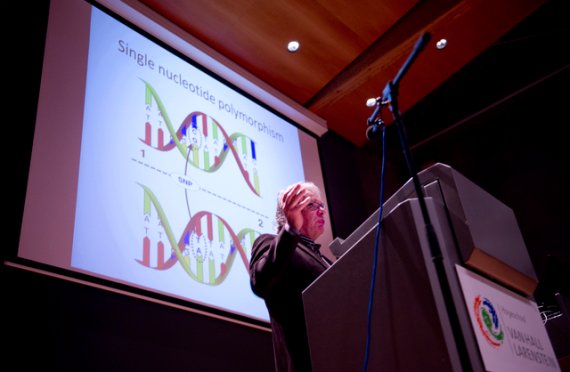Colostrum, the first milk a cow produces after calving, is chockfull of antibodies. It could be a good alternative for antibiotics, which are currently used liberally in livestock farming. Biotechnologist Herman de Boer is developing the substance, recently together with Life Science Research & Development (LSRD), a partnership between Van Hall Larenstein and the Noordelijke Hogeschool in Leeuwarden. De Boer is well-known as the brains behind the genetically modified bull Herman. He gave a guest lecture at VHL in Leeuwarden yesterday. De Boer started his business, Mastivax, in the Frisian village of Oosterwolde two years ago. Last year the natural ‘colostrum antibiotics’ were tested in the laboratory, he explains. About half a million euros is needed to set up a pilot plant and extract the antibodies from colostrum on a large scale. The Life Sciences programme aims to promote an exchange of knowledge between the business world and the educational one, and to relate educational programmes to innovative projects. Graduates often work for companies as project consultants, and get their first research experience this way. VHL and De Boer are preparing an application for a subsidy of several hundred thousand euros from the Fonds Fryslân Fernijt, a grant programme at the province of Friesland. De Boer hopes that the product will be on the market within five years. It is intended for piglets, who are vulnerable to diseases if they are weaned after 20 days. The pig farmer tries to make up for this ‘weaning crisis’ by dosing them with antibiotics. The substance could also be used to treat mastitis in cows. According to De Boer, colostrum contains 50 grams of antibodies per litre. Team manager Antje Hagendorf of LSRD thinks it’s ‘fantastic’ that the programme is involved in this project with De Boer. A fourth-year student of Biotechnology is currently doing an internship at Mastivax. De Boer hopes to benefit in turn from the knowhow of Life Sciences teachers, four of whom have PhDs in Molecular Biology. LSRD is working with other companies too. The programme recently developed a ‘spore trap’ in collaboration with AquaExplorer. This contraption can detect the spores of phytophthora in the air. It sends the farmer a signal when he should apply pesticides to combat the potato disease. This makes it possible to reduce pesticide use. LSRD is also working with water company Capilix on a sensor which can rapidly detect metals in surface water. This will eliminate the need to send off samples, which is so time-consuming.
VHL working on alternative to antibiotics
VHL is collaborating with biochemist Herman de Boer on an alternative to antibiotics in livestock farming. The active substance is extracted from cow’s colostrum. A subsidy from the province of Friesland is being applied for, to fund a pilot plant.

